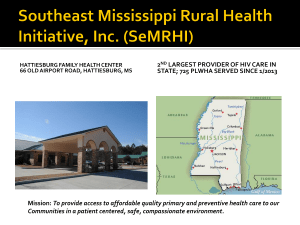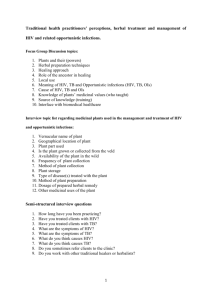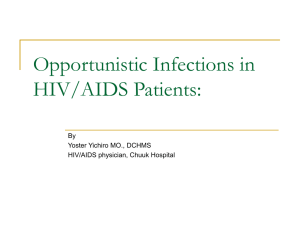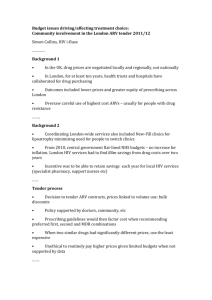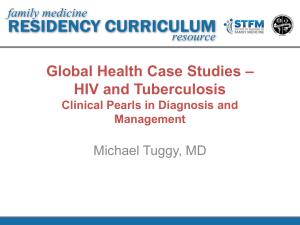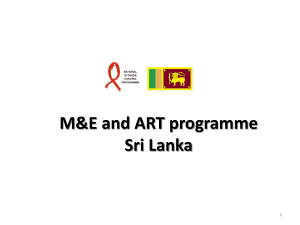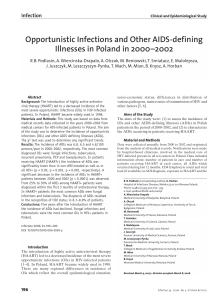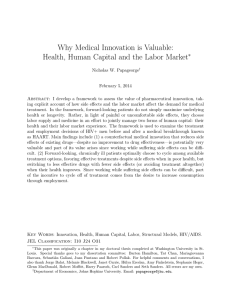Sister Sue Roberts (Word doc)
advertisement
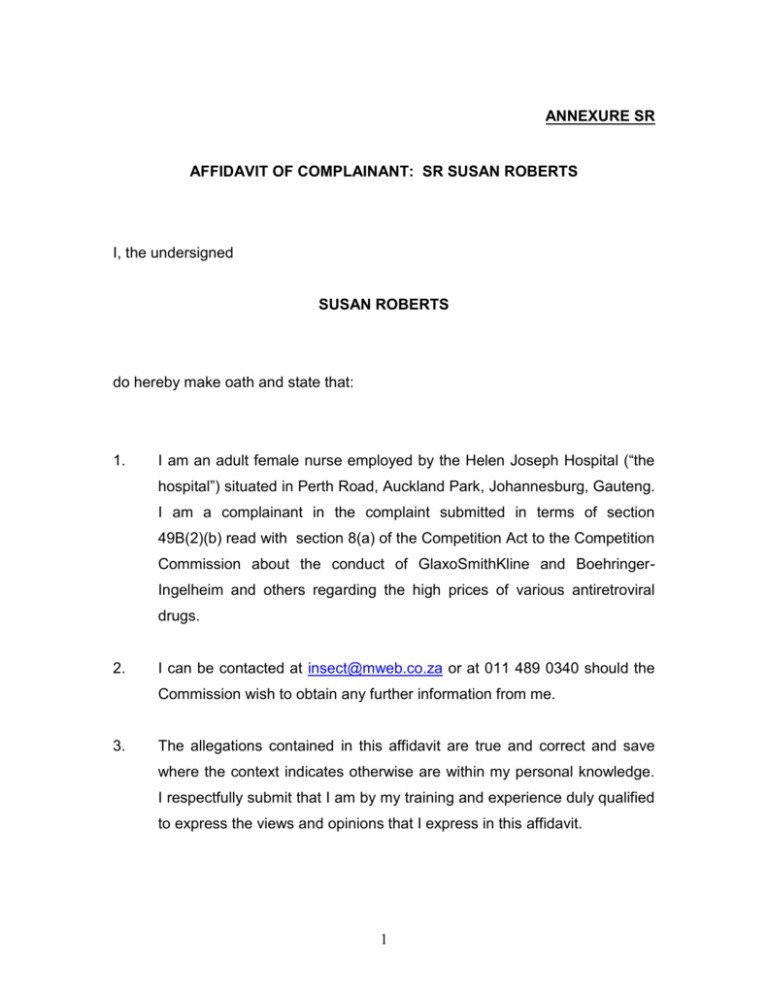
ANNEXURE SR AFFIDAVIT OF COMPLAINANT: SR SUSAN ROBERTS I, the undersigned SUSAN ROBERTS do hereby make oath and state that: 1. I am an adult female nurse employed by the Helen Joseph Hospital (“the hospital”) situated in Perth Road, Auckland Park, Johannesburg, Gauteng. I am a complainant in the complaint submitted in terms of section 49B(2)(b) read with section 8(a) of the Competition Act to the Competition Commission about the conduct of GlaxoSmithKline and BoehringerIngelheim and others regarding the high prices of various antiretroviral drugs. 2. I can be contacted at insect@mweb.co.za or at 011 489 0340 should the Commission wish to obtain any further information from me. 3. The allegations contained in this affidavit are true and correct and save where the context indicates otherwise are within my personal knowledge. I respectfully submit that I am by my training and experience duly qualified to express the views and opinions that I express in this affidavit. 1 4. My complaint is directed at the effect on the patients who I care for of the high prices that are currently being charged for antiretroviral drugs (ARVs) and in particular those ARVs that are the subject of this complaint. In my experience the high prices that are currently being charged has the effect of denying many of my patients access to the treatment that they desperately need. This has a direct effect on me in the performance of my duties as a nurse. I submit this complaint and depose to this affidavit in my personal capacity. 5. I have been employed by the hospital since 1991 and am employed as a Chief Professional Nurse. I am a qualified General Nurse, Midwife and Psychiatric Nurse. I also have a certificate in Infection Control. I am the co-ordinator of the hospital’s HIV Clinic (“the Clinic”) and have held this position since the clinic’s inception ten years ago in June 1992. I annex an abridged curriculum vitae marked SR1. 6. The Clinic’s core function is to provide health care services to in- and outpatients. We also provide counselling services. 7. The hospital diagnoses at least 80 – 90 new HIV infections per week. We counsel the majority of patients with the assistance of volunteer counsellors. 8. In 1992 we had 263 patients in our Clinic. In 2002 there are about 1837 patients. 9. In 1992 more than 40% of patients had a CD4 count above 500, 23 % of patients had a CD4 count below 200 and 15 % of patients had a CD4 count below 50. A patient’s CD4 count is a measure of white blood cells to find out how seriously a person’s immune system has been damaged by HIV. 2 10. In 2001 53 % of our patients had a CD4 count below 200; 26.5 % of patients had a CD4 count below 50. Patients with such a low CD4 count need to be put on treatment to lessen morbidity and mortality. The medical consensus is that patients with a CD4 count of less than 200 should be placed on therapy known as highly active antiretroviral therapy (“HAART”). 11. HAART therapy targets the HIV infection itself, rather than the opportunistic infections that are associated with HIV/AIDS. Because the immune system of a person living with HIV is depleted, the person is vulnerable to infections, which are collectively referred to as opportunistic infections. HAART has revolutionised the management of HIV infection, reducing mortality and morbidity figures and providing additional health benefits including the reduction and / or the elimination of opportunistic infections, the restoration of immune function and a reduction in infectiousness. 12. Our Clinic has the necessary systems in place to administer HAART. Also, our counsellors have had training in ARV support. 13. Due to the growth in the epidemic we now have eight medical wards in which patients with HIV/AIDS are admitted. In 1992 we only had four medical wards. 14. HIV is a massive disease burden that creates a huge demand on hospital beds. The hospital is about 80-85% full at any given time. 15. In the first quarter of 2002, 745 patients were diagnosed with Tuberculosis (TB). In the second quarter of 2002 we diagnosed 684 TB patients. Eighty per cent (80%) of our TB patients are HIV positive. HIV positive persons are especially vulnerable to TB, which is a common opportunistic infection. 3 16. If we could treat these patients with HAART we would be able to reduce the burden on the hospital sector and reduce the demand for hospital beds. 17. Every Thursday we run a specialist HIV Clinic. The Clinic is assisted by several Consultant Physicians who assess the medical problems of patients. Where necessary, the doctors prescribe medicines to patients, and these medicines are collected by the patient at the hospital pharmacy. 18. In certain circumstances the hospital does not have the prescribed medication available. This is because the medicine is not on the government’s essential drug list, due to the high cost of the medicine. In these cases, patients are given a prescription to be taken to a private chemist. ARV medicines are not supplied by the government and therefore patients have to get the drugs from a private chemist. 19. At present, we have about 100 patients on ARV treatment. Therefore, less than 5% of our patients have access to HAART. This is because most of our patients cannot afford treatment at the prices currently charged. 20. Many of our patients who are on ARV treatment are domestic workers whose employers fund their treatment. Some of our patients who are skilled earn enough money to pay for their drugs. A few patients have medical aid benefits that pay for the drugs. Most of our patients do not earn very much. 21. ARV therapies are not provided to patients in the public sector. Where patients are funded by medical aids or where they have private funding (collected by the family) then ARV therapy is prescribed and the medicines are bought from a private chemist. In these cases, the patients 4 are always counselled by clinic staff. This is to ensure that they understand that the medicine needs to be taken regularly and most probably for the rest of their lives. They therefore need to understand that they must be able to afford medicines over an indefinite period of time and for the rest of their lives. 22. Unfortunately many medical aid schemes only cover a patient for a limited amount per month for medication; for example about R1000 per month or R10 000 per year. In some cases the patients have to make arrangements to pay additional amounts themselves each month so that they do not run out of treatment towards the end of the year. Thus, there are very limited options for the doctor who is prescribing such medication. 23. Where patients cannot afford ARV treatment, and depending on their health status, we are able to give them a drug called co-trimoxazole as a prophylaxis to prevent pneumocystis carinii pneumonia (PCP), which is AIDS defining and potentially fatal. Otherwise we are only able to give our patients supportive treatment, including multivitamins. Without access to ARV treatment the steps we can to help a patient are limited. 24. The Clinic therefore provides basic health care for HIV related illnesses unless the patient can afford HAART. Because of the high prices currently charged for ARVs, many of our patients do not have access to treatment. 25. Because some patients suffer intolerable side effects from some of the ARVs or when a treatment regiment is no longer effective with a particular patient, it becomes necessary to change drug regimens. However, because of the high costs of alternative regimens, it is not easy to change regimens when patients present with side effects or there is treatment failure. This makes the management of our patients even more 5 complicated and their proper treatment more difficult. The current high cost of ARVs limits our patient’s choices and treatment options and directly affects their health. For example, a patient may choose to go on ddI and d4T because it is more affordable as opposed to taking AZT and 3TC or Combivir. The former regimen has more side-effects such as lactic acidosis and pancreatitis. 26. While most of our patients have managed on their current treatment regimen we have had problems with some of our patients. Even in the cases where our patients can afford an alternative regimen, keeping them on ARVs causes financial hardship for them and their families due to the increased costs of alternative regimens at the high prices currently being charged. 27. Patients who do well on HAART are a great moral boost for staff at the hospital because when you see patients changing from skeletons to functional human beings it is very uplifting. It makes me feel more positive about the work that I am doing. 28. I have seen cases where patients run out of money to pay for HAART. In these cases their viral load subsequently increased and their CD4 count dropped. Patients lose their jobs because they get fired when they are too sick to work or because of retrenchment. In these circumstances they cannot afford to pay for continued treatment. 29. I feel sorry for the nurses working in the wards who see very ill patients with opportunistic infections on a daily basis. Because of a shortage of hospital beds, patients are often discharged early and while they are still sick. Almost daily, the nurses see sick patients who are not getting better. More and more patients are getting sick and they are not getting treatment because they cannot afford to pay for it at the high prices currently being 6 charged. Our diabetic clinic does not refuse to treat diabetes; however, the HIV Clinic only treats opportunistic infections and not HIV itself. This is very demoralising for health care professionals. 30. I have been a nurse for many years and the burden that HIV is putting on hospitals is making it very difficult for nurses to function effectively. This is because of the workload and the increased number of patients brought on by the HIV/AIDS epidemic. 31. I cannot emphasise sufficiently the crucial importance of making the ARVs which are the subject of this complaint available generally both through public health services and through private chemists (on prescription) at affordable prices. It is impossible to exaggerate the detriment to consumers and to society as a whole of excessive prices charged for these drugs by the companies holding the exclusive rights to manufacture and distribute them. ________________________ SUSAN ROBERTS SIGNED AND SWORN TO BEFORE ME AT ________________ ON THIS THE ____ DAY OF____________ ACKNOWLEDGED THAT SHE 2002, THE DEPONENT HAVING KNOWS AND UNDERTSANDS THE CONTENTS OF THIS AFFIDAVIT, THAT SHE HAS NO OBJECTION TO TAKING THE PRESCRIBED OATH AND THAT SHE CONSIDERS THE SAME AS BINDING ON HER CONSCIENCE. 7 ________________________ COMMISSIONER OF OATHS 8
